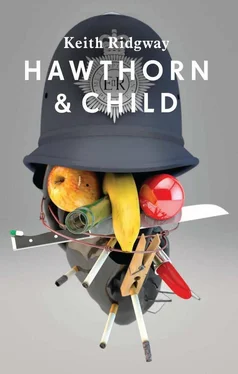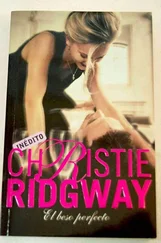And why did he never dream of this?
In the following pages Keith Ridgway gives us
The Spectacular,
a self-contained story from the same fictional world
as Hawthorn & Childand a narrative about the
danger of stories themselves.
I am a writer. I have no money.
There you are. That explains most things.
People are suspicious of writers. We sit there silently, watching and plotting, our sweaty eyes on the room, on the street. Reducing you, summing you up. Writing you off.
Arrogant lot, writers.
I’ve got a story for you mate. Make a great fucking book it would I’m telling you. Problem is no one would believe it. Not a word.
I was a writer. I had no money.
I’m not a writer any more.
I left my wife.
Or, she told me to go.
I moved in to a little flat in Crouch End. Roughly Crouch End. The Archway side of it. Up the hill there.
My landlord was a small, gregarious, exhausting man called Malik. Mr Malik. He owned a pharmacy somewhere, he told me — though it was his wife who was the chemist, not him. And he owned my building, with its five flats and its tiny mess of a garden and its incomprehensible plumbing. He had other buildings too, though perhaps he just managed those. He would show up in the evenings or at the weekend to supervise the shifting of furniture, as if there was in his empire of rooms some sort of internal market for bed bases, wardrobes, kitchen tables. He moved gossip around with as much application, standing in my kitchen slapping dust from his sleeves and washing his hands in my sink, offering me basic data on the nice couple on the ground floor, the French girls on the first floor (very pretty, he said) and the gay couple above, in return for bits and pieces about me — always with the hint that there was all kinds of information I could access if I reciprocated, contributed, got into the eavesdropping spirit of things. He’d never had a writer before. I should write a book about him. About his youth in Lahore, his uncle in politics, the rumours about the death of his aunt. Mostly though about the beautiful love story of him and his wife. Their passion, their struggle, their children.
— Not about tenants though Mr Drayton. I will not let you write about my tenants. There is nothing here that your readers need know. I’m like a doctor, an imam, or, for you … what? A clergyman? A priest? A rabbi? I have three Jewish tenants Mr Drayton — in another house, not here. All good people, and everyone is a Londoner, that’s the truth. All my tenants. The French girls, my Sudanese friend, all my Punjabis — every one of them a Londoner. All Londoners here. You must tell me the names of your books Mr Drayton and I’ll maybe read one. My wife is the reader though. My wife is the brains Mr Drayton, I admit it. A chemist. Books. She has two degrees, she speaks four languages, she reads, she is a loving mother, what can I tell you Mr Drayton? I don’t deserve her. I will bring you a bigger desk. This one is too small for a writer. A new chair. A swivelling chair. I have one. Namjeev will come this evening. Or tomorrow.
The son, by contrast, was a taciturn bearded youth who seemed to consider my attempts to help him carry the desk up three flights of stairs contemptible. His father materialized later on to see how it looked.
— The view, Mr Drayton. The new desk. The new chair. You see that tree? It’s a poplar. A poplar tree. So tall. Very pretty. The view of the poplar tree. How pretty that is. It will inspire great things in you. I know it. I look forward to reading the masterpieces you will write here.
Last night I woke up because I thought that there was someone in my room. I lay there, terrified, in the dark, not moving, convinced that there was someone in my room. There was someone in my room. It took me twenty minutes of sweat and paralysis to work it out. It was me. I was in my room.
I had lunch one day with my agent, Stanley Whitmarsh. I see him once every six months or so and he explains to me why I have no money. I travel west to eat and drink with him — into that strange part of London, the comfortable, monied, afternoon London of Notting Hill and Holland Park. It is not really London at all. Publishers and agents live there.
The books I write are well reviewed. Nobody buys them.
It looked like it would rain and we trotted under the black sky to a gastropub and Stanley chose the wine. He wanted to know what I was working on. I made something up. The truth was that every sentence I started bored me half to death, despite the poplar tree. Who gives a damn, frankly, about novels?
— Rosemary left me, I said.
— Oh God. Oh Clive. Oh I’m so sorry.
He put his hand over mine. I was embarrassed.
— It’s fine. It’s OK. It’s mutual.
I extracted my hand awkwardly. Stanley’s remained there like a vacated shell.
— She left you, you said.
— Yes, but. We both agreed that she should. That I should, I mean. I’ve moved out.
He inclined his head a little and took his hand back.
— What happened?
— Nothing happened. I should give you the new address.
— Are you OK?
— Yes, I’m fine. Really.
He wanted to talk about it and I didn’t.
I imagined people noticing us. There is the writer Clive Drayton, having lunch with his agent Stanley Whitmarsh. This has never happened.
— Money, I said.
— Money.
— Is there any?
He didn’t think so, but he would check, he told me, whether there was something due from Italy, which it was possible that there might be, or Spain, about which he was less sure. It would be nothing very much in any case. Bits and bobs. Dribs and drabs . I wanted to get drunk.
— It’s difficult for everyone, Clive. You know that. Literary fiction is not doing well. It’s big inconsequential trash, memoirs … you know … celebrity shit.
— I need …
I trailed off and poked my crumbling burger with a fork.
— What? You need what?
I had been about to say that I needed some way of making my rent. Mr Malik had collected for June in advance, and I had enough for July and August, and September, perhaps, if I ate only rice. But I would be flat broke, and after that the only option would be a humiliating request to Rosemary. Or an aggressive one — the house was jointly owned.
— I need to feel that I’m not wasting my time.
— You’re not. It’ll come back to us. The important thing though, is this.
Stanley has a habit of announcing that he’s about to say something important, and then pausing for an age while he thinks of something important to say. I played with my food and noticed that I was drinking the wine faster than he was. He wasn’t keeping up. I wondered if that was a signal that there would not be a second bottle. I thought about getting a new agent.
— Great writing, he announced suddenly, spitting a particle of chicken at my chin. Great writing wises. Rises. It rises. It comes to the surface.
He closed his eyes briefly, regretting the image.
— They’re going to forget about celebrities eventually. They’re going to forget about the brand name. They’re going to stop thinking that those peripherals have anything to do with them, with their role, and they’ll put them back in their place. They’re going to remember great writing. Because they’ll want to be great publishers again. Because that’s what it’s actually about, and readers will remind them. This is temporary. You’re a great writer. Of literature . You just have to keep going. Your time is coming. I know you don’t care about money.
— What?
— I know that’s not what’s important to you.
Читать дальше












